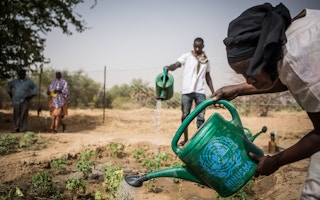Food companies doing business in Africa risk becoming bogged down in decades-long legal disputes over land that could cost tens of millions of dollars, according to a report released on Monday.
From sugar to coffee and palm oil, agribusiness firms could find that the land they are using is already claimed or occupied by local people, researchers said.
Such disputes, already common, can tie up businesses for years and halt trade—and could cause up to $101 million in losses over the next 25 years, said the report from the Overseas Development Institute (ODI), a thinktank, and TMP Systems, a UK-based consultancy.
“All over you get communities who do want to benefit from investment,” said Joseph Feyertag, ODI research fellow.
“But communities need to know exactly what they’re letting themselves into,” he told the Thomson Reuters Foundation.
The report, which collected data from nearly 80 firms, is part of a wider initiative to encourage responsible investment in African agriculture and develop trust between companies and communities.
“The purpose of this is to quantify the costs of doing it wrong,” said Feyertag of ODI, which with TMP Systems developed a free modelling tool that assesses those risks.
“
For the companies, the land is a resource, a tool to extract wealth. For the communities, the land is their lives and source of livelihoods—it’s part of their identity.
Renee Vellve, co-founder, GRAIN
Land and identity
Almost half of all land disputes between sugar companies and local communities in Africa lasted more than 10 years, the report found. Such protracted disputes also caused significant harm and economic stress to local people.
“It’s hard to see how to make these projects win-win when both the investors and the communities want the same land for very different purposes,” said Renee Vellve, co-founder of GRAIN, an international charity that supports social movements in their bid for food self-sufficiency.
“For the companies, the land is a resource, a tool to extract wealth. For the communities, the land is their lives and source of livelihoods—it’s part of their identity.”
For Vellve, clashes are common and are often resolved at the expense of communities, with villagers unable to access fields and forests and to make a living, she told the Thomson Reuters Foundation.
Recent years have seen several high-profile land dispute cases in Africa.
In 2009, a deal by South Korea’s Daewoo Logistics to lease more than 1 million hectares in Madagascar for crops led to the island nation’s ruler being ousted, and fuelled anger against foreign companies using swathes of African farmland.
Last year, Liberia passed a landmark law that would help communities fight foreign land grabs by giving them ownership of ancestral territory.
Prior to that, rights groups had said, the state had signed away more than 40 per cent of national territory in concessions for logging, mining and agriculture.
Under Liberia’s new Land Rights Act, communities can claim ownership of customary land by presenting evidence including oral testimonies, maps and signed agreements with neighbours to prove their tenure.
And, in Sierra Leone, farmers and charities have since 2017 protested the use of 45,000 acres of land in the southern Pujehun province for a palm oil plantation by international agro-investor Socfin.
“While large-scale agri-business activities are a source of much-needed revenue for many countries in Africa, too often poor smallholder farmers, including women, hardly see any fruit,” David Barissa, campaign manager for the charity Oxfam in Africa, said in an interview.
“As national governments open up their borders for these investments, there is an urgent need to find a model that truly includes and respects the rights of farmers.”
This story was published with permission from Thomson Reuters Foundation, the charitable arm of Thomson Reuters, that covers humanitarian news, climate change, women’s and LGBT+ rights, human trafficking and property rights. Visit http://news.trust.org for more stories.










